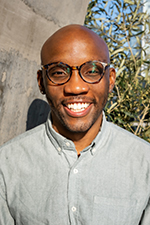Easing the Patient Journey
Kyron Whitfield employs the lessons he learned in Northwestern's MBA + MS in Design Innovation (MMM) program to give Walgreens customers a better online experience.
Kyron Whitfield (MMM ‘22) understands that people filling prescription drug orders are looking for convenient solutions they can trust. As a product manager at Walgreens, his job is to ease their journey from the doctor’s office to the pharmacy.
Whitfield works to improve the first steps patients take when they encounter Walgreens’ digital ecosystem, from creating an online account to discovering additional pharmacy services. To succeed, he relies on the product design lessons he learned through Northwestern's MBA + MS in Design Innovation (MMM) program — a dual-degree program between Northwestern Engineering and the Kellogg School of Management.
 “MMM taught me a number of different ways to consider thoughtful engagement, effective storytelling, and honed, purposeful creativity,” said Whitfield, who joined Walgreens in October 2023. “We have some exciting features coming soon that will make a real difference in people's lives.”
“MMM taught me a number of different ways to consider thoughtful engagement, effective storytelling, and honed, purposeful creativity,” said Whitfield, who joined Walgreens in October 2023. “We have some exciting features coming soon that will make a real difference in people's lives.”
The intersection of technology and marketing is always where Whitfield saw himself. Whitfield spent more than six years as a brand manager at Lenovo prior to Northwestern. During MMM he interned as a product manager at Apple.
Now in the healthcare space at Walgreens, he's able to leverage those design principles while focusing on the brand's digital and physical touchpoints.
Although many of his family members work in healthcare, Whitfield used to be intimidated by the industry.
“Needing care, finding providers, adherence to prescriptions, and ultimately paying for care — the entire journey can be complicated and confusing,” he said. “What excites me about the space is that the work actually matters. People deserve to be well and many need their medications and immunizations to make that possible.”
To help do that, Whitfield relies on a central tenet of the MMM program – human-centered design. This principle teaches that to create the most useful products and services, you must start with intensive end-user research to discover the pain points that need to be addressed.
Whitfield applies that approach to his work at Walgreens on a daily basis.
“We're proud to have been essential resources throughout the COVID-19 pandemic, and that people still rely on our services today as they have for over 100 years,” he said. “That said, there are a lot of different ways we can make the experience a bit more helpful, more accessible, and more useful for patients.”
Whitfield got a first-hand look at the successful product design principles during Research, Design, Build (RDB), a first-year course for MMM students. In that class, Whitfield worked with a hospitality client looking to bring new experiences to their industry while navigating the pandemic.
The Business Innovation Lab (BIL) course during his second year allowed him to apply the same principles to a project for a large consumer packaged goods company.
“We were able to go on site, learn about the business, bring our client through our thought journey, and incorporate feedback from real users into multiple proposals,” he said of his BIL experience. “I really felt like I was a part of an innovation consultant team.”
Looking back on his time in the MMM program, Whitfield said he learned exactly what he was hoping for: how to combine art and science to create the most useful products and services.
“It’s the art of empathetic creativity and then the science of business – desirability, feasibility, and viability,” he said. "It's one thing to be really passionate and have cool ideas, but as a business, you're going to have to justify those investments. The ability to have a smaller cohort of people going through the same thing and bringing in different backgrounds to work with real clients on real projects, all of that made MMM a great choice.”
